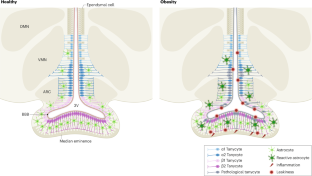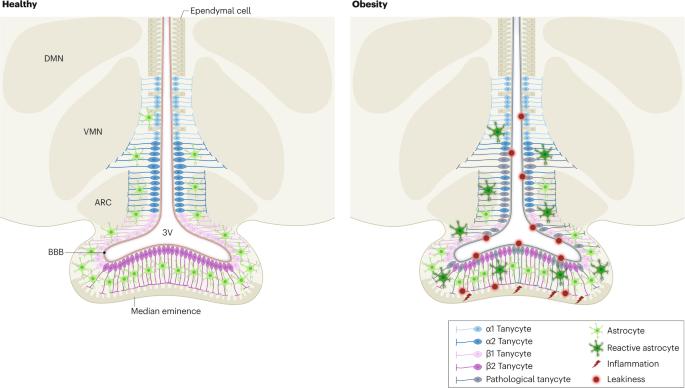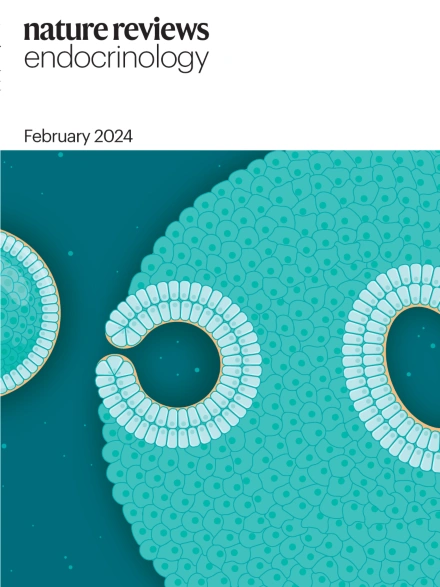The interactions between energy homeostasis and neurovascular plasticity
IF 31
1区 医学
Q1 ENDOCRINOLOGY & METABOLISM
引用次数: 0
Abstract
Food intake and energy expenditure are sensed and processed by multiple brain centres to uphold energy homeostasis. Evidence from the past decade points to the brain vasculature as a new critical player in regulating energy balance that functions in close association with the local neuronal networks. Nutritional imbalances alter many properties of the neurovascular system (such as neurovascular coupling and blood–brain barrier permeability), thus suggesting a bidirectional link between the nutritional milieu and neurovascular health. Increasing numbers of people are consuming a Western diet (comprising ultra-processed food with high-fat and high-sugar content) and have a sedentary lifestyle, with these factors contributing to the current obesity epidemic. Emerging pharmacological interventions (for example, glucagon-like peptide 1 receptor agonists) successfully trigger weight loss. However, whether these approaches can reverse the detrimental effects of long-term exposure to the Western diet (such as neurovascular uncoupling, neuroinflammation and blood–brain barrier disruption) and maintain stable body weight in the long-term needs to be clarified in addition to possible adverse effects. Lifestyle interventions revert the nutritional trigger for obesity and positively affect our overall health, including the cardiovascular system. This Perspective examines how lifestyle interventions affect the neurovascular system and neuronal networks. Nutritional imbalances (such as overnutrition in obesity) alter many properties of the neurovascular system, including neurovascular coupling and blood–brain barrier permeability. This Perspective examines how lifestyle interventions targeting weight loss, including intermittent fasting, caloric restriction and physical activity, affect the neurovascular system and neuronal networks.


能量平衡与神经血管可塑性之间的相互作用
食物摄入和能量消耗由多个大脑中枢感知和处理,以维持能量平衡。过去十年的研究表明,脑血管是调节能量平衡的一个新的关键角色,其功能与局部神经元网络密切相关。营养失衡会改变神经血管系统的许多特性(如神经血管耦合和血脑屏障通透性),从而表明营养环境与神经血管健康之间存在双向联系。越来越多的人摄入西式饮食(包括高脂肪和高糖分的超加工食品),并过着久坐不动的生活方式,这些因素导致了目前肥胖症的流行。新出现的药物干预(如胰高血糖素样肽 1 受体激动剂)成功地减轻了体重。然而,这些方法是否能逆转长期暴露于西方饮食的有害影响(如神经血管解偶联、神经炎症和血脑屏障破坏),并长期维持体重稳定,除了可能的不良影响外,还有待明确。生活方式干预可逆转肥胖的营养诱因,并对我们的整体健康(包括心血管系统)产生积极影响。本视角将探讨生活方式干预如何影响神经血管系统和神经元网络。
本文章由计算机程序翻译,如有差异,请以英文原文为准。
求助全文
约1分钟内获得全文
求助全文
来源期刊

Nature Reviews Endocrinology
医学-内分泌学与代谢
CiteScore
42.00
自引率
0.70%
发文量
158
审稿时长
6-12 weeks
期刊介绍:
Nature Reviews Endocrinology aspires to be the foremost platform for reviews and commentaries catering to the scientific communities it serves. The journal aims to publish articles characterized by authority, accessibility, and clarity, enhanced with easily understandable figures, tables, and other visual aids. The goal is to offer an unparalleled service to authors, referees, and readers, striving to maximize the usefulness and impact of each article. Nature Reviews Endocrinology publishes Research Highlights, Comments, News & Views, Reviews, Consensus Statements, and Perspectives relevant to researchers and clinicians in the fields of endocrinology and metabolism. Its broad scope ensures that the work it publishes reaches the widest possible audience.
 求助内容:
求助内容: 应助结果提醒方式:
应助结果提醒方式:


